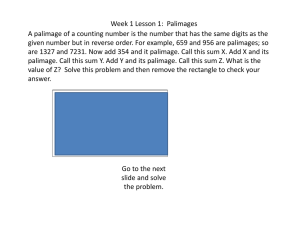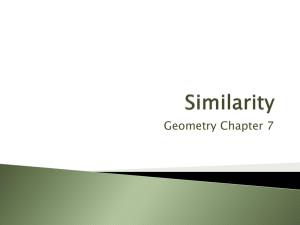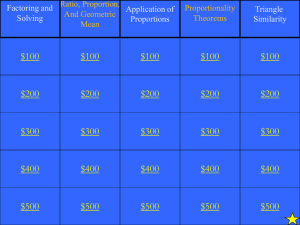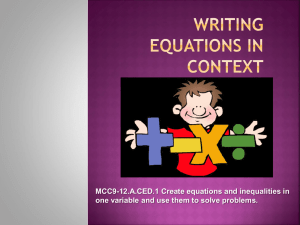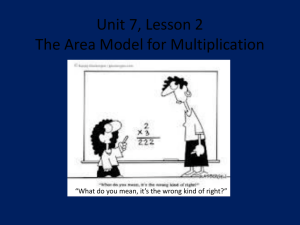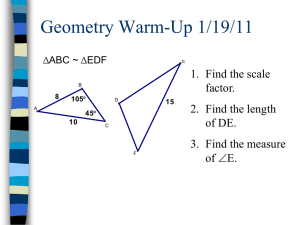REVIEW – CHAPTER 4 & 5 Stretching & Shrinking
advertisement
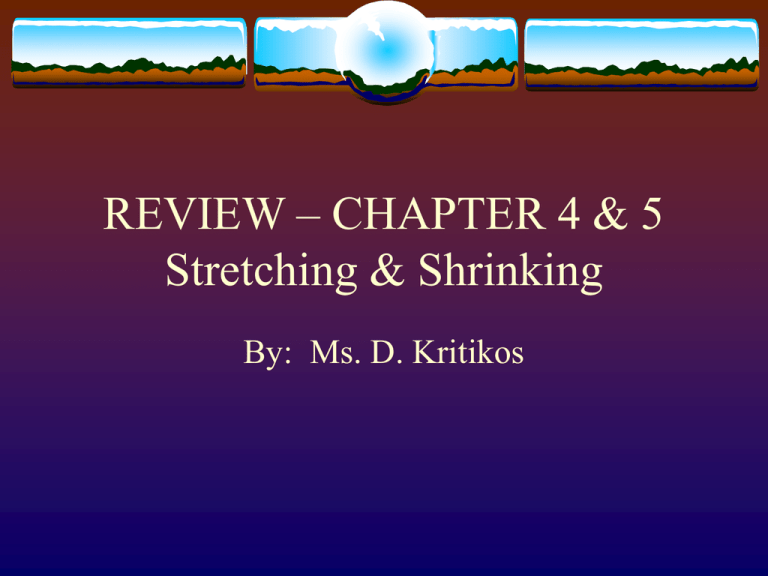
REVIEW – CHAPTER 4 & 5 Stretching & Shrinking By: Ms. D. Kritikos Similar Figures Polygons that have the same shape are similar. Similar figures must have: Corresponding angles that are congruent Corresponding sides that have SCALE FACTOR (ratio of the lengths are proportional) The triangles below are similar. Find the missing measurements. a 3 2.75 a = _____ 8 b 11 b = _____ 16 24 c c = _____ There are 2 different ways to solve this problem: FIRST WAY, by using Scale Factor: Find 2 corresponding sides in similar figures where both measurements are know. Divide the larger number by the smaller number. Find the corresponding side to the unknown measurement; if the smaller number is known, multiply it by the scale factor. If the larger number is known, divide it by the scale factor. To solve this problem by using scale factor: 1. Find the known corresponding side measurements in the first 2 triangles. 2.75 and 11 2. Divide the larger number by the smaller number. 3. Find the corresponding side to a (8) and divide it by the scale factor of 4. a 3 2.75 2 a = _____ 8 b 11 16 24 c b = _____ c = _____ Continue to use scale factor to find b: 1. Since the scale factor is 4 between the first 2 triangles, we can find b by applying it to the corresponding side of b. 3 2. Multiply 3 by the scale factor of 4 to find b. a 3 2.75 2 a = _____ 8 b 11 16 24 c 12 b = _____ c = _____ Continue to use scale factor to find c: 1. Find the known corresponding side measurements in the second and third triangles. 8 and 16 2. Divide the larger number by the smaller number. 3. Find the corresponding side to c (11) and multiply it by the scale factor of 2. a 3 2.75 2 a = _____ 8 b 11 16 24 c 12 b = _____ 22 c = _____ To solve this problem by using proportions: 1. Find the known corresponding side measurements in the first 2 triangles. 2.75 and 11 2. Find the corresponding side to a (8). a 3 2.75 2 a = _____ 8 b 11 16 24 c b = _____ c = _____ Continue solving this problem by using proportions: 3. Set up the proportion in one of these two formats: Triangle #1KnownMeasurement CorrespondingSideMea surement OR Triangle #1UnknownMeasurement CorrespondingSideMea surement Triangle #1KnowMeasurement Triangle #2UnknownMeasurement CorrespondingSideMea surement CorrespondingSideMea surement a 3 2.75 a = _____ 8 b 11 16 24 c b = _____ c = _____ Finish solving this problem by using proportions: 2.75 11 a 8 Cross multiply to solve for missing side 2.75 8 a 11 2.75 8 11 a 11a 22.00 a2 a 3 22.00 11a 2a 8 2.75 b 11 2 a = _____ 2.75 a 11 8 16 24 c b = _____ c = _____ Finish solving this problem by using proportions: 8 b 16 24 8 24 16 b 192 16b 12 b a 3 Set up Proportions to solve for b and c, then cross multiply to solve for missing sides. 8 2.75 b 11 2 a = _____ 8 11 16 c 8 c 16 11 8c 176 c 22 16 24 c 12 b = _____ 22 c = _____ An antique shop has a large dollhouse that is a model of a real house. Here are some of the measurements: Height Window Building Dollhouse 5 cm 80 cm Actual house 1 m (100 cm) 16 m (1600 cm) 1. What is the height of the building? (hint: 100 cm = 1 m) Find the SCALE FACTOR between known corresponding sides, then apply that information to find the actual building height. 100 5 20 20 80 1600cm 16m An antique shop has a large dollhouse that is a model of a real house. Here are some of the measurements: Height Window Building Dollhouse 5 cm 80 cm Actual house 1m 16 m 2. If the area of the living-room floor in the dollhouse is ¼ of a square meter, how much carpeting will be needed to cover the floor in the real house?? Apply SCALE FACTOR squared for area, then multiply by the amount of carpeting needed for the doll house. 20 400 .25 100m 2 2 An antique shop has a large dollhouse that is a model of a real house. Here are some of the measurements: Height Window Building Dollhouse 5 cm 80 cm Actual house 1m 3. If the dollhouse has 12 windows, how many windows does the real house have? 12 4. If it takes 25 centimeters of molding to frame the door of the dollhouse, how much molding is needed to frame the door of the real house? 25 20 500cm 100 5m Complete the table below. 2 5 Rectangle Scale Short Long Perimeter Area Factor Side Side 14 10 A 1 2 5 B 2 4 10 28 40 C 5 10 25 70 250 D ½ 1 2.5 7 2.5 The area of rectangle C is how many times larger than the area of rectangle B? B 2 C 6 4 2 4 8 12 6 12 72 72 8 9 Scale factor squared is the difference between the area of 2 similar figures. 3 9 2 The perimeter of rectangle C is how many times larger than the perimeter of rectangle B? B 2 C 6 4 12 2(4 2) 2(6) 12 2(6 12) 2(18) 36 36 12 3 Scale factor is the difference between the perimeter of 2 similar figures. SF 3 Joan used a mirror to estimate the height of a flagpole. What is the height of the flagpole? 5 ft flagpole 2 ft---|-----------------9 ft----------------------- 2 5 9 x 2 x 95 x 22.5 ft 2 x 45 Find all the triangles similar to Triangle A. ONLY D A B C D E 12 6 3 4 5 9 3 1 3 2 12 4 9 3 6 1 3 2 3 3 1 4 3 5 2 Any questions??? Ask any questions you may have now. That is the purpose of a review. Today and tomorrow is for questions, not the day of the test. Complete the review sheet individually. While in class, if you have a question, please ask your teacher. While finishing the review sheet at home, write down any questions you may have so you can ask them tomorrow. Come to class tomorrow with the completed review sheet. We will discuss each question in class, and you will have the opportunity to ask questions.


